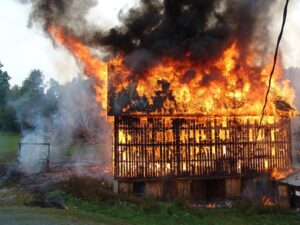What would you do if someone showed up to burn your barn and devastate you financially? For many Shenandoah County residents, this question was more than theoretical when Sheridan’s Union troops went through the Valley in the fall of 1864 doing exactly that. I can only imagine the anger, bitterness, and hatred I would feel if they showed up at my place.
Some local farmers, however, choose a different path. In Robert Mowery’s incredible book, A History of Calvary Virginia, he recounts the story of how John Koontz managed to save both the Sheetz Mill, which he owned, and his barn from being destroyed. 
When federal troops arrived in early October to do their awful deeds, Koontz had his tenant’s wife prepare a fine dinner for them. After filling their bellies with his generosity and her skill, Koontz led the barnburners out to inspect the family barn. Upon finding nothing inside, they decided there was no use to reduce it to ashes.
From there, they went on to examine the mill and considered it a possible source of grain for their horses and a potential refuge for their troops. After considering all options, the soldiers also let it stand as it did for another century along sleepy Sheetz Mill Road west of Woodstock. Thankfully, the Civil War ended only months later, due in part to the emptying of the Confederate’s Shenandoah Valley breadbasket, and both the barn and the mill saw heavy use thereafter to feed those recovering from the war’s devastation.
As I read that account and thought about how fortunate the Koontz family was to have been spared what happened to virtually all other farms, I remembered some words of Jesus. In Matthew 5, He tells His disciples to, “Love your enemies and pray for those who persecute you, that you may be sons of your Father in heaven.” He also said, “Do not resist an evil person. If someone strikes you on the right cheek, turn to him the other also. And if someone wants to sue you and take your tunic, let him have your cloak as well. If someone forces you to go one mile, go with him two miles.”
Many times we dismiss these as lofty, impractical, and idealistic teachings, but Jesus was deadly serious. In Romans 12 one of His greatest followers, Paul, taught, “If your enemy is hungry, feed him; if he is thirsty, give him something to drink. In doing this, you will heap burning coals on his head. Do not be overcome by evil, but overcome evil with good.”
It’s easy to read and discuss such directives in Sunday School, but to live them out when your enemy arrives to burn down your barn is a good bit more challenging. I haven’t been able to determine if Biblical advice motivated Koontz’s actions that October day, but either way the kindness he extended surely played a pivotal role in sparing these structures, his family’s livelihood, and the community which benefited from them.
Paul’s mention of heaping burning coals on your enemy’s head has been interpreted in a variety of ways from making them ashamed of their actions to giving them the means to prepare their own meals. Regardless of the interpretation, however, kindness is very difficult to fight back against, even when you want to or have been commanded to do so. How might such kindness in the face of ugly cruelty transform the contentious culture in which we live today?
There’s no guarantee of a beneficial or peaceful outcome, of course, and we’re well aware that in spite of Jesus’ and Paul’s kindnesses, both were mercilessly killed by the Romans. Nevertheless, Jesus invites obedience irrespective of, and even in spite of, the consequences. Being kind to and loving our enemies is not only right because it might benefit us, it’s a way of copying God’s actions in sending His blessings to those who love Him as well as those who don’t even believe in Him. It’s counterintuitive and contradicts human wisdom, and yet, it is the way of Jesus.
As we encounter those who make our lives difficult or who may even desire our demise, may we have the courage, grace, and love to follow Jesus and do them good. It just might spare our barns in the process.
Blessings, George